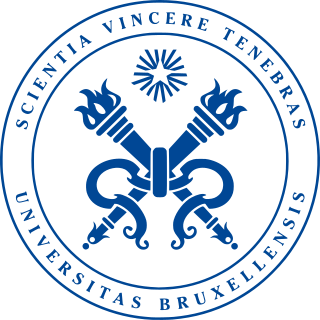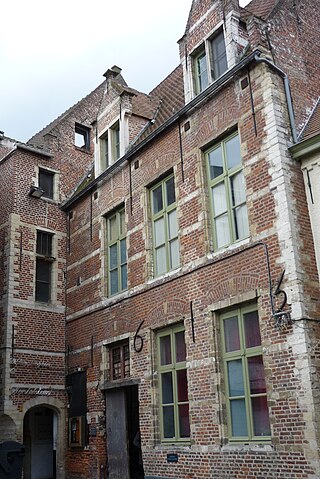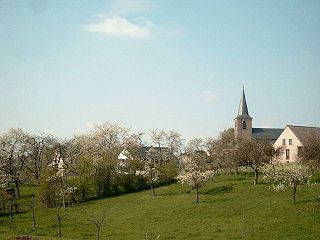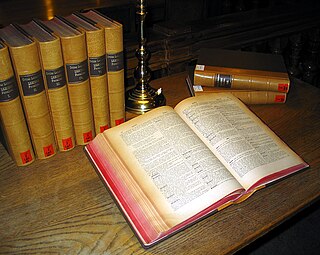
Leuven, also called Louvain, is the capital and largest city of the province of Flemish Brabant in the Flemish Region of Belgium. It is located about 25 kilometres east of Brussels. The municipality itself comprises the sub-municipalities of Heverlee, Kessel-Lo, Leuven proper, Wilsele, Wijgmaal and part of Haasrode and Korbeek-Lo. It is the eighth largest city in Belgium, with more than 100,244 inhabitants.

The Catholic University of Leuven or Louvain was founded in 1834 in Mechelen as the Catholic University of Belgium, and moved its seat to the town of Leuven in 1835, changing its name to Catholic University of Leuven. In 1968, it was split into two universities, the Katholieke Universiteit Leuven and the Université catholique de Louvain, following tensions between the Dutch and French-speaking student bodies.
Walloon is a Romance language that is spoken in much of Wallonia and, to a very small extent, in Brussels, Belgium; some villages near Givet, northern France; and a clutch of communities in northeastern Wisconsin, United States.

The Deipnosophistae is an early 3rd-century AD Greek work by the Greek author Athenaeus of Naucratis. It is a long work of literary, historical, and antiquarian references set in Rome at a series of banquets held by the protagonist Publius Livius Larensis for an assembly of grammarians, lexicographers, jurists, musicians, and hangers-on.

The Université libre de Bruxelles is a French-speaking research university in Brussels, Belgium. It has three campuses: the Solbosch campus, the Plaine campus and the Erasmus campus.

UCLouvain is Belgium's largest French-speaking university. It is located in Louvain-la-Neuve, which was expressly built to house the university, and Brussels, Charleroi, Mons, Tournai and Namur. Since September 2018, the university uses the branding UCLouvain, replacing the acronym UCL, following a merger with Saint-Louis University, Brussels.

The Collegium Trilingue, often also called Collegium trium linguarum, or, after its creator Collegium Buslidianum, is a university that was founded in 1517 under the patronage of the humanist, Hieronymus van Busleyden. The three languages taught were Latin, Greek and Hebrew. It was the model for the Collège de France founded in 1530. It is located in Leuven, Belgium.

The Hesbaye, or Haspengouw, is a traditional cultural and geophysical region in eastern Belgium. It is a loamy plateau region which forms a watershed between the Meuse and Scheldt drainage basins. It has been one of the main agricultural regions in what is now Belgium since before Roman times, and specifically named in records since the Middle Ages, when it was an important Frankish pagus or gau, called Hasbania in medieval Latin.
The Institute of Philosophy is the faculty of philosophy at the KU Leuven in the Belgian city of Leuven. It was founded in 1968 when the Institut supérieur de Philosophie - Hoger Instituut voor Wijsbegeerte of the Catholic University of Leuven (1835–1968) was split into a Dutch-speaking entity and a French-speaking entity. Its main buildings are located in the center of Leuven at the Kardinaal Mercier Square, named for the founder of the original institute.

UCLouvain Saint-Louis Brussels is an autonomous university campus specialized in social and human sciences part of UCLouvain and based in Brussels, Belgium.

The Latin language is still taught in many parts of the world. In many countries it is offered as an optional subject in some secondary schools and universities, and may be compulsory for students in certain institutions or following certain courses. For those wishing to learn the language independently, there are printed and online resources.
Pierre Willems was a Dutch philologist and historian of Ancient Rome.
Julien Klener is a Belgian linguist born in Ostend, Belgium in 1939.

The Leuven Faculty of Theology was a branch of the Catholic University of Leuven, founded in 1834 in Mechelen by the bishops of Belgium as the Catholic University of Belgium, that moved its seat to the town of Leuven in 1835, changing its name to Catholic University of Leuven.

KU Leuven is a Catholic research university in the city of Leuven, Belgium. Founded in 1425, it is the oldest university in Belgium and the oldest university in the Low Countries.

The Irish College of St Anthony, in Leuven, Belgium, known in Irish: Coláiste na nGael i Lobháin, Latin: Hibernorum Collegii S. Antonii de Padua Lovanii, French: Collège des Irlandais à Louvain and Dutch: Iers College Leuven, has been a centre of Irish learning on the European Continent since the early 17th century. The college was dedicated to St. Anthony of Padua.

The Robert Catteau secondary school is a French-speaking school owned by the City of Brussels, located on rue Ernest Allard, part of the subsidized public schools network enseignement officiel. Since 1948, it holds the name of Robert Catteau (1880-1956), attorney, journalist and alderman of the City of Brussels. The original name of the school was École moyenne A, founded in 1851 within the Free University of Brussels. The school provides modern general education preparing for university studies and qualifies itself as a "center of excellence".

Philip Rubens (1574–1611), was a Flemish antiquarian, librarian, philologist and city administrator from the Habsburg Netherlands. He was the older brother of the prominent Flemish Baroque painter Peter Paul Rubens.
Philippe d'Outreman was a Jesuit writer from Valenciennes, then in the County of Hainaut, Habsburg Netherlands.

The Catholic University of Leuven was one of Belgium's major universities. It split along linguistic lines after a period of civil unrest in 1967–68 commonly known as the Leuven Affair in French and Flemish Leuven, based on a contemporary slogan, in Dutch. The crisis shook Belgian politics and led to the fall of the government of Paul Vanden Boeynants. It marked an escalation of the linguistic tension in Belgium after World War II and had lasting consequences for other bilingual institutions in Belgium within higher education and politics alike. In 1970 the first of several state reforms occurred, marking the start of Belgium's transition to a federal state.















